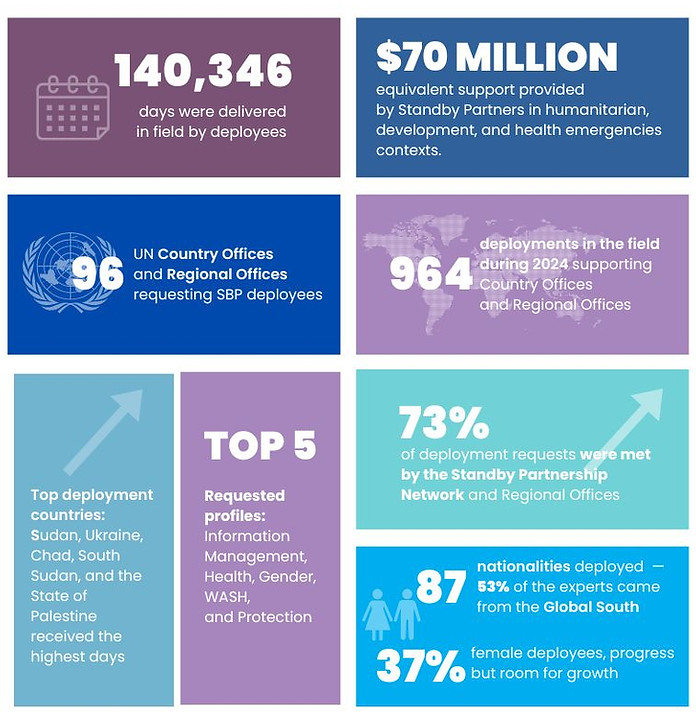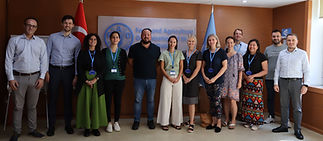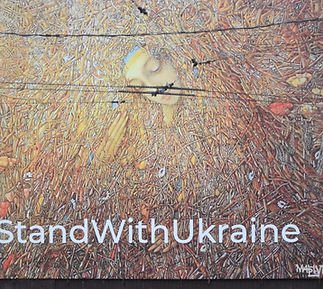
IMPACT
2024 Deployment Results

Impact of Standby Deployees
Rapid deployment capacity
Standby deployees are skilled personnel who can be deployed to crisis zones almost immediately. This helps United Nations organisations respond to emergencies faster, reducing initial response time and improving efficiency in urgent situations.
Development of local capacity
Standby deployees work directly with national staff, government counterparts and local NGOs, as well as in some roles directly with affected community members, sharing skills and knowledge between local experts and standby deployees that strengthens the response.
Access to specialised expertise
Standby deployees are specialists with unique, specialised and niche skills and experiences that might not be available in sufficient capacity in United Nations organisations.
Extended deployment duration
Standby deployees are in place for extended periods, allowing them to serve as a "knowledge bridge" across different phases of the response. This continuity ensures that lessons learned and operational insights are carried forward, improving the consistency and effectiveness of humanitarian efforts.
Knowledge and experience transfer
Standby deployees often bring valuable knowledge from previous deployments, in other emergencies and with other United Nations organisations, contributing best practices and innovative solutions. This cumulative experience enriches field operations, allowing teams to apply proven methods and adapt quickly based on real-world insights.
Impact monitoring
SBPN
Joint Monitoring Mission 2024 -
The Sudan Plus Crisis Response
Since the outbreak of conflict in Sudan in April 2023, UN humanitarian operations have heavily relied on Standby Partnership deployees. Between January 2023 and October 2024, 117 experts were deployed to Sudan, Chad, South Sudan, Egypt, Ethiopia, and Kenya to support lifesaving operations.
The Joint Monitoring Mission found that SBPN deployees were critical to delivering urgent humanitarian assistance, maintaining UN operations, and strengthening national and local capacities. Despite enormous challenges, the SBP mechanism met 68% of identified needs. Receiving UN offices rated the impact of SBP deployees as “Highly Satisfactory". Read the summary report below.
SBPN Joint Monitoring Mission 2023 -
Türkiye & Syria earthquake
Post earthquake in Türkiye and Syria, many United Nations Country Offices have benefited from significant assistance provided by the Standby Partnership Network. As at the monitoring mission, a total of 85 requests had been made by the UN Agencies, out of which 63 positions were filled by 14 deploying organisations.
United Nations agencies acknowledged specifically that their organisations wouldn’t have been able to deliver and implement their work with the same quality, speed, and scale without the Standby deployees on the ground.

SBPN Joint Monitoring Mission 2022 -
Ukraine Response
The Standby Partnership Network provided a significant contribution to the Ukraine response - at the time of the monitoring mission, 128 experts had been deployed to 10 United Nations Agencies in Ukraine (70), Moldova (26), Poland (15) and to other countries (17) by a total of 16 Standby Partners.
United Nations offices specifically mentioned the added value of standby deployees in bringing fresh ideas, a different perspective and experience, and a new approach to resolving problems. They noted deployee's positive and proactive attitude in hardship contexts, strengthening capacity building of national staff or newly recruited staff and in bringing their technical and interpersonal experience gained in different contexts.
_edited.jpg)

